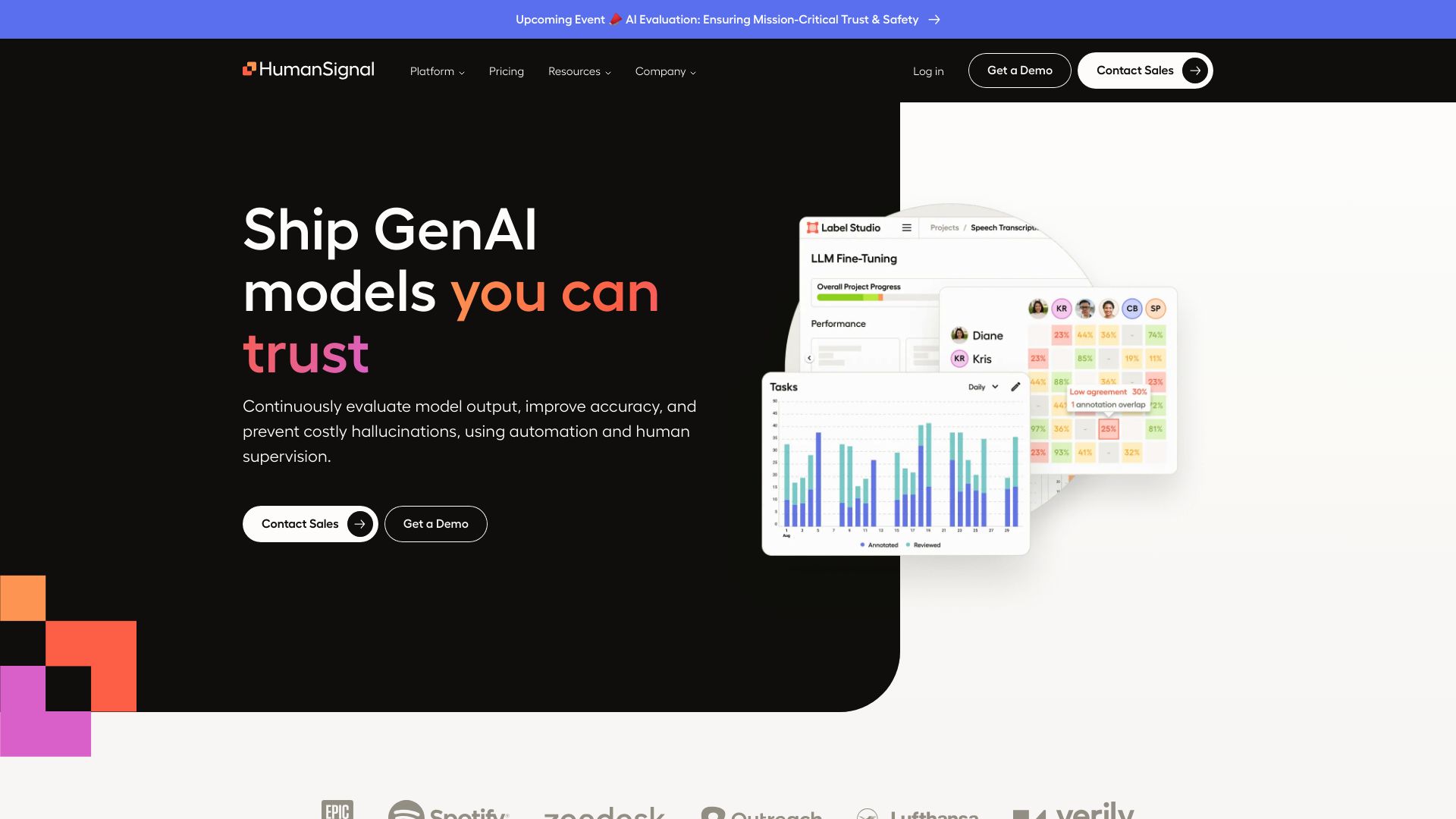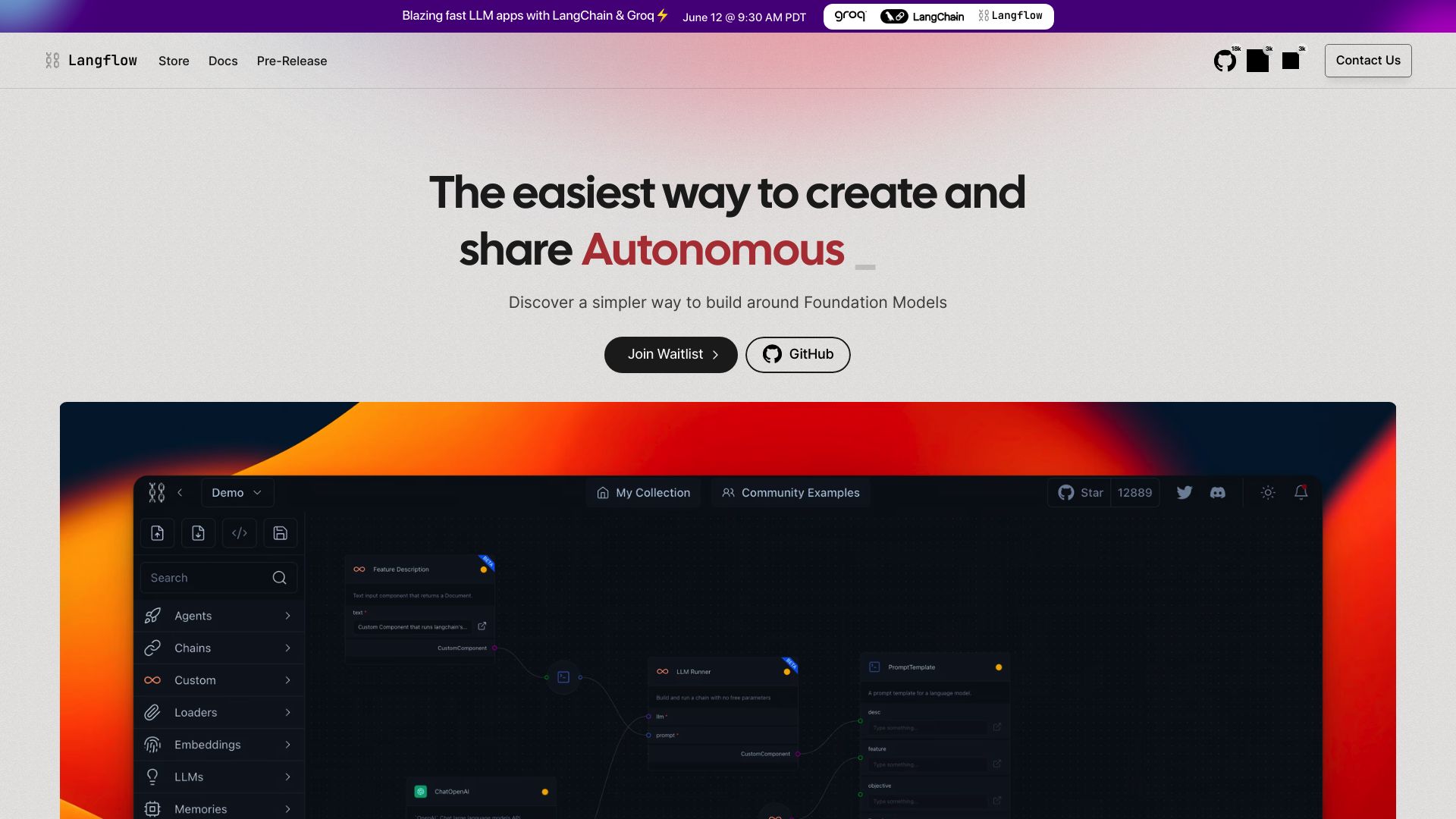Artificial intelligence powers the future of business innovation, but choosing the right development platform can challenge even seasoned technologists. Our comprehensive comparison of Adala vs. Langflow, and SmythOS illuminates the strengths and limitations of each, empowering readers to select the ideal solution for their AI endeavors.
We explore how these platforms tackle core AI development tasks, evaluate their ease of use, and assess their ability to scale. Whether you’re a developer seeking powerful APIs, a business leader focused on enterprise-grade security, or an entrepreneur looking for accessible AI tools, this review provides the insights needed to make an informed decision in today’s competitive AI landscape.
Adala Overview
Adala revolutionizes data labeling with its open-source framework for building autonomous AI agents. These agents acquire specialized skills for tasks like text classification, summarization, and question answering, continuously improving through interactions with data and human feedback.
Adala revolutionizes data labeling with its open-source framework for building autonomous AI agents… continuously improving through interactions with data and human feedback.

Adala leverages large language models as the core runtime for executing skills and tasks. The framework supports modular, extensible skill development, allowing agents to learn from labeled ground truth datasets provided by users. This guided training process ensures reliability and adaptability.
Key features include short-term and long-term memory capabilities, enabling agents to learn and retain information from past interactions. Adala also incorporates human-in-the-loop processes, allowing for continuous refinement and validation of data labeling tasks. The platform supports multiple agents with different skills, facilitating collaboration on complex data processing challenges.
Key features include short-term and long-term memory capabilities… Adala also incorporates human-in-the-loop processes, allowing for continuous refinement and validation of data labeling tasks.
While Adala excels in autonomous data labeling, it lacks certain features found in more comprehensive AI development platforms. The framework does not offer a visual builder or no-code editor, requiring users to interact through code and APIs. Additionally, there’s no explicit mention of multimodal capabilities or support for various file formats beyond text data.
Adala’s open-source nature and modular architecture encourage community contributions, fostering continuous evolution and improvement of the framework. This approach positions Adala as a powerful tool for developers and data scientists seeking to create customized, efficient data labeling solutions while maintaining high-quality results through AI-human collaboration.
Langflow Overview
Langflow empowers developers to create AI applications through a low-code platform that simplifies complex workflows. This open-source tool combines intuitive design with powerful capabilities, making AI development accessible to users with varying technical expertise.
The platform’s drag-and-drop interface allows users to visually construct AI workflows using pre-built LangChain components. Developers can leverage large language models, agents, and other AI tools to prototype and experiment effortlessly. Langflow’s user-friendly approach significantly reduces the learning curve for AI application development.
Langflow empowers developers to create AI applications through a low-code platform that simplifies complex workflows… making AI development accessible to users with varying technical expertise.
Langflow prioritizes flexibility and security. The robust Command-Line Interface (CLI) offers advanced users granular control over project settings, while enhanced authentication mechanisms ensure secure deployments. The platform’s API integration capabilities enable programmatic access to components and workflows, supporting both synchronous and asynchronous processing.

A standout feature of Langflow is its customization potential. Users can create bespoke components using Python scripts, tailoring the platform to specific needs and integrating custom functionalities. This extensibility empowers developers to push the boundaries of AI application development within the Langflow ecosystem.
Users can create bespoke components using Python scripts, tailoring the platform to specific needs and integrating custom functionalities.
While Langflow offers significant advantages, users should consider potential limitations. The platform may have a learning curve for those entirely new to AI workflows, and its low-code approach might not provide the same level of control as high-code solutions for highly specific requirements. Additionally, scalability for large-scale deployments and complex workflows may require careful consideration.
Langflow’s vision centers on democratizing AI by enabling users of all backgrounds to build and integrate AI applications into their workflows. By combining low-code accessibility with extensive customization options and secure authentication, Langflow aims to empower users to effectively leverage AI technologies, regardless of their technical expertise.
Feature Comparison
Adala vs. Langflow offer distinct approaches to AI development, with notable differences in their core components and security features. Adala focuses on autonomous data labeling agents, providing a framework for creating specialized AI models that can learn and improve through interactions with data and human feedback. In contrast, Langflow emphasizes a low-code platform for building AI applications using pre-built LangChain components.
In terms of core components, Adala lacks a visual builder and no-code editor, requiring users to interact through code and APIs. Langflow, however, offers a drag-and-drop interface that simplifies the creation of AI workflows, making it more accessible to users with varying technical expertise. This gap in visual development tools significantly impacts the ease of use and learning curve for each platform.
Regarding security features, Adala does not explicitly mention data encryption, OAuth integration, or IP control capabilities. Langflow, while also not detailing specific security measures, emphasizes enhanced authentication mechanisms for secure deployments. This disparity in documented security features may be a crucial consideration for users dealing with sensitive data or requiring robust access controls.
| Adala | Langflow | SmythOS | |
|---|---|---|---|
| CORE FEATURES | |||
| Hosted Agents (Dev, Production) | ❌ | ✅ | ✅ |
| Visual Builder | ❌ | ✅ | ✅ |
| No-Code Options | ❌ | ✅ | ✅ |
| Debug Tools | ❌ | ✅ | ✅ |
| Multimodal | ❌ | ✅ | ✅ |
| Problem-Solving Capabilities | ✅ | ❌ | ✅ |
| Multi-Agent Collaboration | ❌ | ✅ | ✅ |
| Audit Logs for Analytics | ❌ | ✅ | ✅ |
| Work as Team | ✅ | ❌ | ✅ |
| Bulk Work | ✅ | ❌ | ✅ |
| Agent Work Scheduler | ✅ | ❌ | ✅ |
| SECURITY | |||
| Data Encryption | ❌ | ❌ | ✅ |
| OAuth | ❌ | ✅ | ✅ |
| IP Control | ❌ | ❌ | ✅ |
| COMPONENTS | |||
| Foundation AIs | ✅ | ❌ | ✅ |
| Huggingface AIs | ❌ | ✅ | ✅ |
| Zapier APIs | ❌ | ✅ | ✅ |
| All other APIs, RPA | ❌ | ❌ | ✅ |
| Data Lakes | ❌ | ✅ | ✅ |
| DEPLOYMENT OPTIONS (EMBODIMENTS) | |||
| Deploy as API | ✅ | ❌ | ✅ |
| Deploy as Webhook | ❌ | ✅ | ✅ |
| Staging Domains | ❌ | ✅ | ✅ |
| Production Domains | ❌ | ❌ | ✅ |
| API Authentication (OAuth + Key) | ❌ | ❌ | ✅ |
| Deploy as Site Chat | ❌ | ❌ | ✅ |
| Deploy as Scheduled Agent | ❌ | ✅ | ✅ |
| Deploy as GPT | ✅ | ❌ | ✅ |
| DATA LAKE SUPPORT | |||
| Sitemap Crawler | ❌ | ❌ | ✅ |
| YouTube Transcript Crawler | ❌ | ✅ | |
| URL Crawler | ❌ | ❌ | ✅ |
| PDF Support | ❌ | ❌ | ✅ |
| Word File Support | ❌ | ✅ | ✅ |
| TXT File Support | ❌ | ✅ | ✅ |
Best Alternative to Adala and Langflow
SmythOS emerges as the superior alternative to Adala and Langflow, offering a comprehensive agentic AI automation platform that addresses the limitations of its competitors. Our platform combines powerful features with unparalleled ease of use, making it the ideal choice for businesses and developers seeking to harness the full potential of AI.
We provide a visual builder and no-code options that surpass Adala’s code-centric approach, allowing users of all technical backgrounds to create sophisticated AI agents effortlessly. Unlike Langflow’s limited functionality in complex workflows, SmythOS offers advanced problem-solving capabilities and multi-agent collaboration, enabling the development of intricate AI solutions for diverse use cases.
SmythOS emerges as the superior alternative to Adala and Langflow, offering a comprehensive agentic AI automation platform that addresses the limitations of its competitors.
Security is a top priority for SmythOS. We implement robust data encryption, OAuth integration, and IP control features, addressing the security gaps present in both Adala and Langflow. This ensures that your sensitive data and AI operations remain protected at all times.
SmythOS stands out with its extensive deployment options, including API, webhook, site chat, and scheduled agent functionalities. These features, combined with our scalable architecture, provide unmatched flexibility for integrating AI agents into existing systems and workflows. Whether you’re a small startup or a large enterprise, SmythOS adapts to your needs, offering a level of versatility that Adala and Langflow simply cannot match.
SmythOS stands out with its extensive deployment options… providing unmatched flexibility for integrating AI agents into existing systems and workflows.
By choosing SmythOS, you’re not just selecting an AI agent builder – you’re investing in a future-proof platform that continuously evolves to meet the challenges of tomorrow’s AI landscape. Our commitment to innovation, user-friendliness, and comprehensive feature set makes SmythOS the clear choice for those seeking to unlock the full potential of AI automation.
Conclusion
Adala and Langflow offer distinct approaches to AI development, each with unique strengths. Adala excels in autonomous data labeling, leveraging AI agents that continuously improve through data interactions and human feedback. Langflow provides a low-code platform for building AI applications, emphasizing accessibility with its drag-and-drop interface and pre-built components.
While both tools have their merits, SmythOS emerges as the superior choice for comprehensive AI development and deployment. Our platform combines the best of both worlds, offering autonomous agents like Adala and a user-friendly interface like Langflow, while expanding capabilities far beyond either competitor. SmythOS provides a complete ecosystem for AI development, from visual building to deployment across multiple channels.
SmythOS stands out with its extensive feature set, including multimodal interactions, problem-solving capabilities, and seamless integrations with over 300,000 APIs and services. Our platform’s versatility allows for deployment as APIs, chatbots, scheduled agents, and even GPTs, providing unparalleled flexibility for businesses of all sizes. With robust security features, scalability, and support for various data formats, SmythOS empowers users to harness AI’s full potential efficiently and securely.
We invite you to experience the power of SmythOS firsthand. Create a free account today and discover how our platform can revolutionize your AI development process. For those seeking inspiration, explore our extensive library of agent templates to jumpstart your projects. Let SmythOS be your partner in unleashing AI’s transformative potential across your organization.